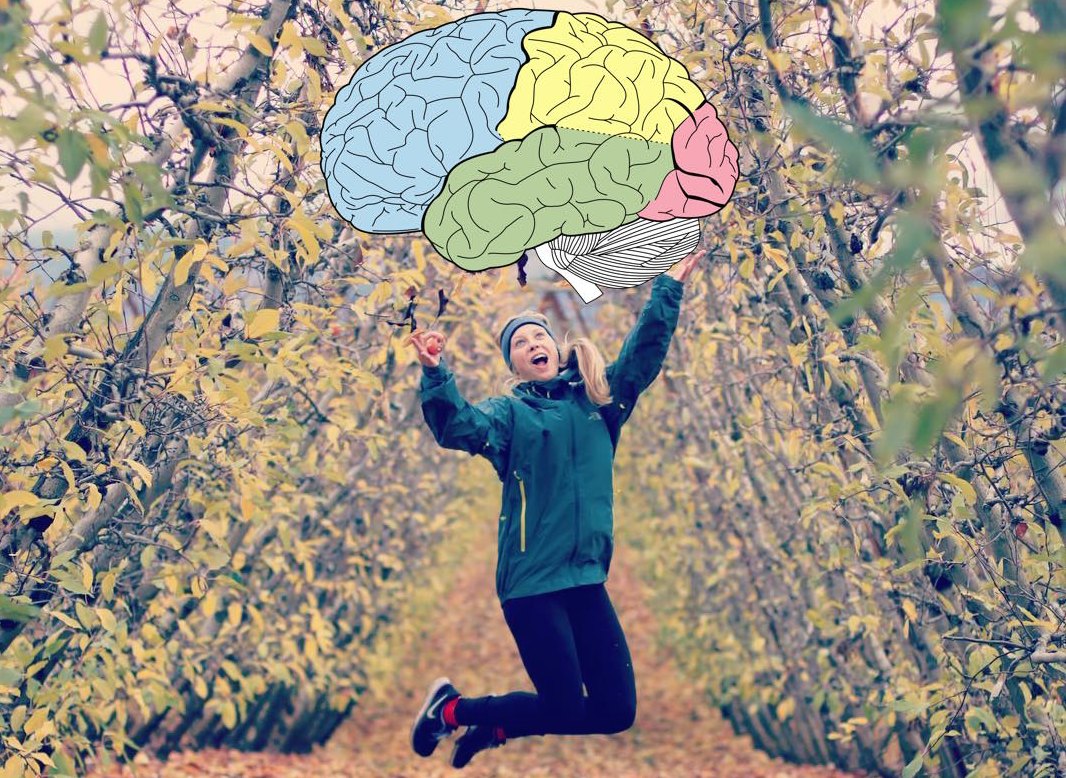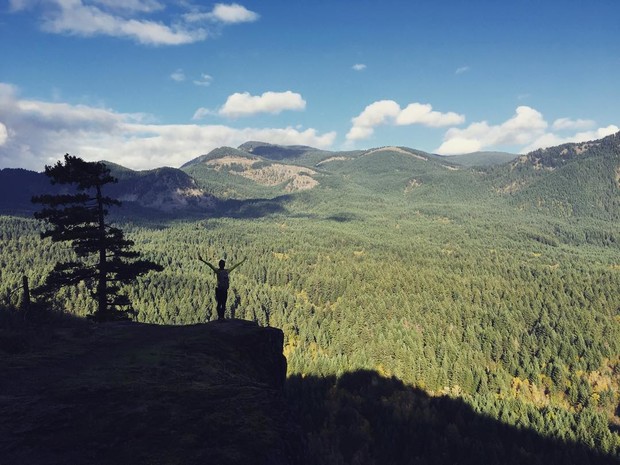

What The Outdoors Does To Your Brain
Popular Stories
 Your brain loves the outdoors! Let it free! Kate Parker photo.
Your brain loves the outdoors! Let it free! Kate Parker photo.
It's very likely those of you reading this spend the majority of your time outside and thus, are well aware of how awesome it makes you feel. You know hiking in the woods is significantly more enjoyable then sitting at a desk, and you’d rather bike outside in the rain than in a gym. Have you ever wondered what’s going on in your brain while your engaging in those outdoor activities?
Here are some conclusions from various scientific studies exploring what's going on in our brains and general physiology when we're outside, and why we should do it so much more.
#1: Nature Clears Your Head
 Hiker Annie Hamilton getting lost in the beautiful fall Aspens. Kate Parker photo.
Hiker Annie Hamilton getting lost in the beautiful fall Aspens. Kate Parker photo.
According to a study published in Proceedings of the National Academy of Sciences, a 90-minute walk through a natural environment has a remarkably positive impact on people. In a survey taken afterwards, those who took the natural walk showed far lower levels of anxiety or obsessive worry. The control group who spent 90 minutes walking through a city did not share the nature groups up-beat mood.
The scientists collected brain scans of the subjects and found differences in the blood flow to the subgenual prefrontal cortex between the groups. What does this mean? Increased blood flow to this region of the brain is associated with bad moods. Everything from feeling sad about something, to worrying, to major depression seem to be tied to this brain area. This particular study found that hiking deactivated it.
#2: It Spurs Creativity
 Flying high over the forests of Oregon. Kate Parker photo.
Flying high over the forests of Oregon. Kate Parker photo.
In a 2012 study, psychologists Ruth Ann Atchley and David L. found that after a four day-long hike in the wilderness, with no access to technology, participants scored a whopping 50% higher on a creativity and problem solving test. Problem-solving skills are thought to originate in the same area of the brain that we also use for selective attention and threat detection. These scientists are concerned that our ability to think creatively is likely being overwhelmed by the constant stimulus of digital and indoor life.
#3: It improves Your Mood and Lowers Stress
 Rivers and lakes have been shown to significantly reduce stress and boost self-esteem. Kate Parker photo.
Rivers and lakes have been shown to significantly reduce stress and boost self-esteem. Kate Parker photo.
Studies comparing indoor versus outdoor activity conducted in natural environments suggest that outdoor activities cause greater feelings of revitalization and positive engagement. All types of green exercise activities also improve self-esteem and combat negative moods like tension, anger and depression. Interestingly, the first five minutes of green exercise appears to have the biggest impact on mood and self-esteem, which suggests there is an immediate psychological health benefit.
Nature may be a solution to stress. Hormones like adrenaline, noradrenaline and the stress hormone cortisol all fall after being within nature. In a nutshell, this means nature effects multiple stress systems in our bodies (sympatho-adrenal medullary and the hypothalamus-pituitary-adrenal axis). Other physiological effects include a decrease in muscular tension.
Sign Up for the TGR Gravity Check Newsletter Now
#4: It’s Good For Your Heart
 Sunsets may pull hard your heart strings, but the outdoors in general help that heart beat better. Cole Buckhart photo.
Sunsets may pull hard your heart strings, but the outdoors in general help that heart beat better. Cole Buckhart photo.
This is very interesting: nature helps lower your blood pressure and return it to normal levels post-exercise. Japanese studies monitoring the physiological effect of walking within real forest environments reported that significantly lower systolic and diastolic blood pressure occurred after walking in the forest (as well as just looking at it), when compared to the same activity in an urban environment. High blood pressure is no fun and games. It’s been related to issues like coronary artery damage, heart attacks, heart disease, congestive heart failure, atherosclerosis (fatty buildups in the arteries that cause them to harden) and strokes.
#5: It Improves Your Immune System
Walking in nature has been found to improve your immune function in the form of increased natural killer cell activity. Natural killer cells are our body’s weapon against invading bacteria and viruses. Without these guys, we would be in big trouble. In one study, natural killer cell activity increased for up to 30 days after a three-day trip to a forest. Essentially, our interaction with nature helps us defend ourselves from bugs we catch!
#6: You’re Less Likely To Snack on Unhealthy Foods
 Fresh fruits and veggies. Kate Parker photo.
Fresh fruits and veggies. Kate Parker photo.
When we are indoors at home, we’re more likely to snack. Medium and high TV viewership has been found to be associated with snacking more frequently, and frequent viewers also report more consumption of energy-dense snacks. So, a healthy benefit of outdoor recreation is a decreased likelihood of overeating. And of course, while outdoors, people are less likely to be sedentary! Extra bonus, with another entire range of health benefits related to exercise.
 Even just being outside will allow you to enjoy these health benefits. Pull up a chair. Kate Parker photo.
Even just being outside will allow you to enjoy these health benefits. Pull up a chair. Kate Parker photo.
We know nature makes us feel good. It's why when the sun comes out everybody jumps for joy and heads to the lakes and rivers. Yet, worldwide, 31.1% of adults are physically inactive. Some of the decline is attributed to technological advances and the shift of structured activity to gyms, sports halls and in-home workout DVDs.
Also, rapid urbanization has led to less green space available for people to undertake physical activity or sports. Numerous studies link outdoor lifestyles, nature walks, and even indoor plants to healthier and happier populations. So share the joy and get your friends, family, children and yourself outside! When it comes to the outdoors, a little goes a long way.



